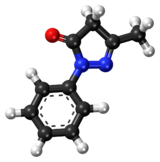 | |
 | |
| Clinical data | |
|---|---|
| Trade names | Radicava, others |
| Other names | MCI-186 |
| AHFS/Drugs.com | Monograph |
| MedlinePlus | a617027 |
| License data | |
| Pregnancy category |
|
| Routes of administration | Intravenous, by mouth |
| ATC code | |
| Legal status | |
| Legal status | |
| Identifiers | |
| |
| CAS Number | |
| PubChem CID | |
| DrugBank | |
| ChemSpider | |
| UNII | |
| KEGG | |
| ChEBI | |
| ChEMBL | |
| PDB ligand | |
| CompTox Dashboard (EPA) | |
| ECHA InfoCard | 100.001.719 |
| Chemical and physical data | |
| Formula | C10H10N2O |
| Molar mass | 174.203 g·mol−1 |
| 3D model (JSmol) | |
| |
| |
| (verify) | |
Edaravone, sold under the brand name Radicava among others, is a medication used to treat stroke and amyotrophic lateral sclerosis (ALS).[4][5] It is given by intravenous infusion[4] and by mouth.[4][6]
The mechanism by which edaravone might be effective is unknown.[4] The medication is known to be an antioxidant, and oxidative stress has been hypothesized to be part of the process that kills neurons in people with ALS and in stroke victims.[7]
The most common side effects include bruising (contusions), problems walking (gait disturbances), and headaches.[6]
The U.S. Food and Drug Administration (FDA) considers it to be a first-in-class medication.[8]
- ^ a b "Radicava". Therapeutic Goods Administration (TGA). 24 February 2023. Archived from the original on 24 February 2023. Retrieved 7 April 2023.
- ^ "Radicava edaravone 30 mg/20 mL concentrated injection ampoule (375455)". Therapeutic Goods Administration (TGA). 16 February 2023. Archived from the original on 8 April 2023. Retrieved 7 April 2023.
- ^ "Regulatory Decision Summary for Radicava". 23 October 2014. Archived from the original on 7 June 2022. Retrieved 7 June 2022.
- ^ a b c d e "Radicava- edaravone injection Radicava ORS- edaravone kit". DailyMed. 12 May 2022. Archived from the original on 27 January 2022. Retrieved 27 May 2022.
- ^ Bailly C, Hecquet PE, Kouach M, Thuru X, Goossens JF (May 2020). "Chemical reactivity and uses of 1-phenyl-3-methyl-5-pyrazolone (PMP), also known as edaravone". Bioorganic & Medicinal Chemistry. 28 (10): 115463. doi:10.1016/j.bmc.2020.115463. PMID 32241621. S2CID 214766793.
- ^ a b "FDA Approves Oral Form of ALS Treatment". U.S. Food and Drug Administration (FDA). 12 May 2022. Archived from the original on 12 May 2022. Retrieved 12 May 2022.
 This article incorporates text from this source, which is in the public domain.
This article incorporates text from this source, which is in the public domain.
- ^ Cite error: The named reference
Petrov2017was invoked but never defined (see the help page). - ^ New Drug Therapy Approvals 2017 (PDF). U.S. Food and Drug Administration (FDA) (Report). January 2018. Archived from the original on 23 October 2020. Retrieved 16 September 2020.